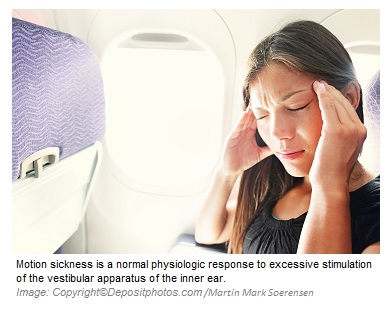Motion sickness is the feeling of nausea, vomiting, and dizziness due to repetitive acceleration and deceleration.
 This condition could occur when traveling by a car (car sickness), plane (air sickness), or ship (sea sickness).
This condition could occur when traveling by a car (car sickness), plane (air sickness), or ship (sea sickness).
Motion sickness is common in 30 – 40% of people, affecting mostly women and children between 2 and 12 years old and being uncommon under 2 years old and after 50 years old. Interestingly, most astronauts also experience motion sickness during their travel by space shuttles (space sickness).
It is believed that motion sickness is a normal physiologic response to excessive stimulation of the vestibular apparatus of the inner ear.
Nutritional Supports:
Restricted Foods:
- Foods high in fat.
- Foods high in animal proteins.
- Chocolate.
- Heavy meals before traveling.
- Fried foods.
- Greasy foods.
- Alcohol.
- Spicy foods.
Recommended Dietary Advices:
- Drinking enough water, as dehydration may aggravate motion sickness.
- Small meals before traveling.
- Snacking on dry crackers or a piece of bread.
- Sipping a glass of water with lime or lemon juice in it.
- Fresh fruits and vegetables.
- Tomatoes.
- Lime.
- Lemon.
Recommended Supplements:
- Ginger: 500 mg 1-2 hours before traveling, and then 500 mg every 2-3 hours if needed.
- Peppermint: 300 mg, or peppermint tea mixed with lime juice to soothe stomach upset.
- Vitamin B1 (Thiamine): 200 mg 12 hours before traveling, and then another 200 mg 6 hours before traveling.

